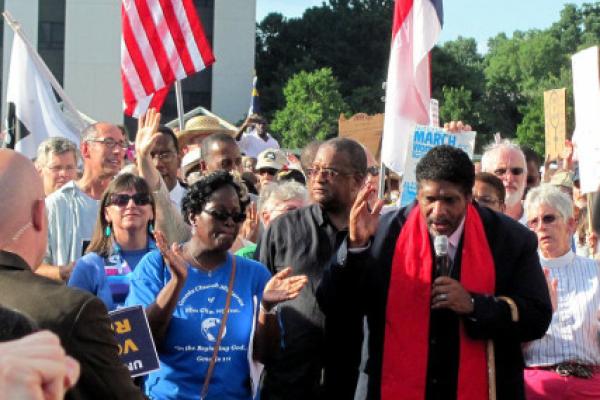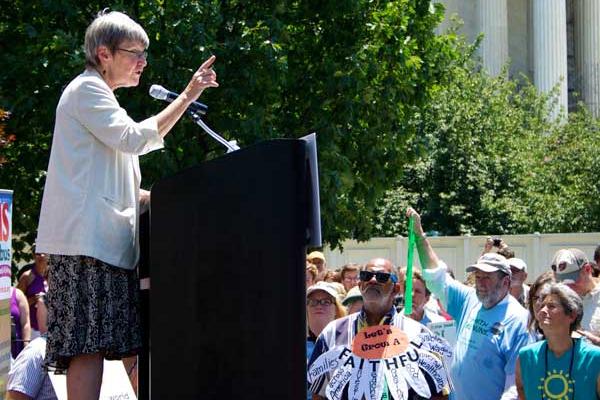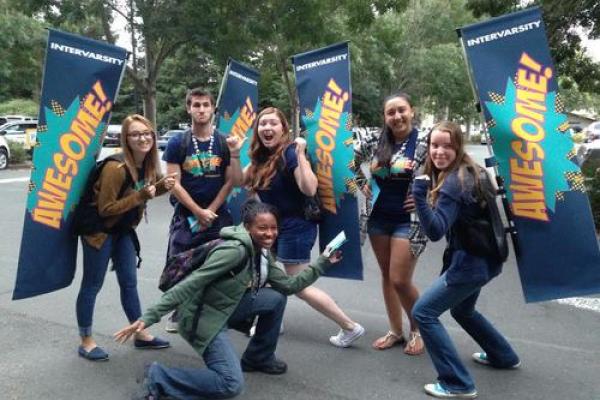I’ve had the chance to speak with author and international peace activist John Paul Lederach about his book, Reconcile: Conflict Transformation for Ordinary Christians. The book, updated from an earlier edition with a new introduction from Bill and Lynne Hybels and additional stories, is a powerful guide on how to seek and realize peace among us on both local and global scales.
Having traveled the world brokering peace agreements between governments and rebel groups, and having risked his own lives and that of his family for the sake of reconciliation, Lederach speaks prophetically to difficult issues facing us today in a way that few can.
From Gaza to Iraq and even Ferguson, Mo., we want to know: what do we do now? Thankfully John Paul Lederach offers us both the hope and the tools to begin achieving reconciliation, wherever we are. In our discussion below we talk about his book, which is capturing the attention and imaginations of leaders everywhere.
Editor's Note: The following transcript is from a homily given in Christ Chapel at Gustavus Adolphus College in St. Peter, Minn. As part of the “From Segregation to Integration through Conversation” faith and learning series, the text for the day was 1 Corinthians 12:14-26.
The color of my skin is white. I am Caucasian. I am white, from head to toe, in case you had not noticed. It is quite possible that you had not noticed, because in case you have not noticed, most days in this place, most all of us have skin that is white. And as those of us that experience winters in Minnesota know better than most, in the midst of a “white out” it is difficult to notice anything that is not white.
While there are some special days with some special circumstances and some special exceptions, we in this place tend to be white people surrounded with other white people. Because the fact of the matter is that most white people in most places tend to have social circles that are mostly filled with other white people.
As was recently reported by the Public Religion Research Institute’s 2013 American Values survey, when respondents were asked to identity as many as seven people with whom they had discussed important matters in the six months prior to the survey, the results revealed just how segregated white social circles actually are. As reported by the study, the social circles of white people in the United States are 91 percent white. In addition, the analysis also showed that over 75 percent of white people reported exclusively white social circles, without any minority presence whatsoever.
All together, the Public Religion Research Institute showed the sociological fact that, even in an increasingly diverse multi-cultural nation, birds in the United States with white feathers — such as my own — continue to flock together. In other words, contrary to the common cliché often given in response to these difficult topics, when it comes to white American people, the facts reveal that "some of our best friends" simply are not black.
Faith leaders who sit to the left in American politics say they won’t let the religious right claim the moral mantle in the elections of 2014.
On Sept. 9, they announced a new campaign to boost voter registration and encourage voters, particularly in poor and immigrant communities, to go to the polls.
On a conference call to reporters, Ted Strickland of the Center for American Progress Action Fund, an ordained Methodist minister and former Democratic governor of Ohio, said he and others leaders will go door to door and church to church to press their message: that people of faith should pursue a public policy that is fair and just.
The Rev. William Barber, leader of North Carolina’s “Moral Monday” movement, which has long protested acts of the state’s conservative legislature, quoted Isaiah 10: “Woe to those who make unjust laws.”
This week, the Baltimore Ravens terminated the contract of star runningback Ray Rice after video of Rice beating his then-fiancée Janay emerged online. Rice had previously been suspended for two games for the assault. With the release of the video, media scrutiny swiftly turned to his now-wife, speculating over why she would marry her abuser.
Beverly Gooden, a human resources manager and blogger, had a different response. Herself a survivor of domestic abuse, Gooden began tweeting of her own experiences, each one a vulnerable explanation: #WhyIStayed.
Gooden wrote, “I can't speak for Janay Rice, but I can speak for Beverly Gooden. Why did I stay? … Leaving was a process, not an event. And sometimes it takes awhile to navigate through the process. ...I hope those tweeting using #WhyIStayed find a voice, find love, find compassion, and find hope.”
We would all do well to listen. Some of the most powerful tweets below.
My sons, Issac and Felipe are my pride and joy. My wife and I go to church with them every Sunday, and we spend our free time at the movies or enjoying a walk through downtown Chicago. We also take road trips, one of which brought us to New York City where we visited the Statue of Liberty and Ellis Island.
I brought them there because I wanted them to see
the most important American monument in person. The Statue of Liberty is the icon of freedom and a historic welcoming signal to immigrants.
Chicago is my home. It's been that way for the past 17 years. I'm a maintenance worker at a residential building and a member of SEIU Local 1. I'm kind of living the American dream. I say "kind-of" because my undocumented status has prevented me from pursuing better job opportunities. I had the chance to become an assistant engineer at my building but declined the offer because I'm scared of losing the job if my bosses discover that I'm undocumented.
There’s something romantic about a pair of lovebirds on the lamb, fleeing the authorities to keep their love alive. But add a few more wives, and not so much. When the first episode of “Sister Wives” aired on TLC featuring the poly-union of Kody Brown and his four co-star wives, Utah police announced the very next day that they would investigate the illegal union. Brown promptly relocated his brood to Nevada, leaving one intolerant state for another where polygamists are allowed to run free, and from there filed a complaint in a U.S. district court challenging the law that spurned their love.
After years of struggle, last month a Utah judge struck down the state’s polygamy law , decriminalizing poly-unions in the state that has endured a relentless barrage of polygamy punch lines, even during the decades where it was expressly verboten. The case will now advance to an appeals court, but conservative harbingers are already offering “I told you sos,” largely bemoaning the slide down the slippery slope of morality opened by same-sex unions.
But is morality the only way to talk about marriage and sex? Certainly the American judiciary thinks otherwise as it hammers out the constitutionality of every union under the sun. The polygamy question could broaden the discussion among evangelicals to include nuances beyond morality.
This time it’s the Catholic sisters versus the Koch brothers.
That’s one way to look at the upcoming “Nuns on the Bus” tour, which hits the road Sept. 17 for the third time in three years, a monthlong trip though 10 key U.S. Senate battleground states to campaign against the influence of outside money on politics.
The issue has come to be identified with the wealthy industrialist brothers Charles and David Koch, whose huge contributions to conservative political causes have raised concerns about the role of “dark money” on elections.
The spigot for such undisclosed donations, which can be made by unions as well as corporations, was opened by the controversial 2010 Citizens United Supreme Court decision. That was followed by another 5-4 ruling in April of this year, McCutcheon v. Federal Election Commission.
A well-established international Christian student group is being denied recognition at almost two dozen California college campuses because it requires leaders to adhere to Christian beliefs, effectively closing its leadership ranks to non-Christians and gays.
California State University, which has 23 campuses, is “de-recognizing” local chapters of InterVarsity Christian Fellowship, an evangelical Christian group with 860 chapters in the United States. The university system says InterVarsity’s leadership policy conflicts with its state-mandated nondiscrimination policy requiring membership and leadership in all official student groups be open to all.
“For an organization to be recognized, they must sign a general nondiscrimination policy,” said Mike Uhlencamp, director of public affairs for the California State University system. “We have engaged with (InterVarsity) for the better part of a year and informed them they would have to sign a general nondiscrimination statement. They have not.”
We love the latest Facebook “book challenge" going around. It reads something like this:
"List 10 books that have stayed with you in some way. Don't over-think this — they don't have to be the 'right' books or great works of literature. Just books that have impacted you in some way."
We at Sojourners are a book-loving bunch, from religion and spirituality to politics; social justice to science; cultural history to historical fiction. Below are 10 favorite or most formative books from several staff here at Sojourners (in addition to books of the Bible, which could take several spots themselves).
See any of your favorites here? Which books do you most love? Share in the comments!
The Pentagon on Sept. 5 confirmed that the leader of al-Shabab, an al-Qaida-linked organization in Africa, was killed in a U.S. airstrike in Somalia this week.
The leader, Ahmed Abdi Godane, was targeted Sept. 1 in an airstrike that hit a vehicle and compound in a militant stronghold south of the capital, Mogadishu.
Al-Shabab has been linked to a number of attacks in Africa, including the bloody siege at the upscale Westgate Mall in Nairobi, Kenya, in September 2013 that killed 67 people.
“Removing Godane from the battlefield is a major symbolic and operational loss to al-Shabab,” Pentagon Press Secretary Rear Admiral John Kirby said in a statement.
At the time of the strike, the Pentagon said it could not confirm Godane’s death.









